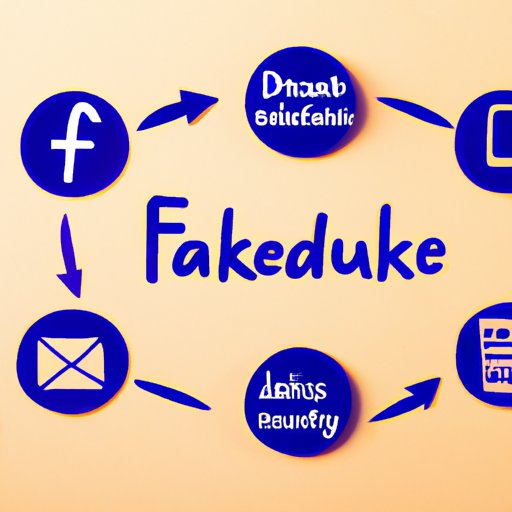
Introduction
Facebook is a powerful platform that connects us with friends and family all over the world. However, the overwhelming notifications, distractions and invasion of privacy that come with it can take a toll on our mental health. If you find that you need a break from Facebook, this article is for you. Here, we will guide you through the step-by-step process of deactivating your Facebook account, and discuss why taking a break from social media can offer so many benefits.
Step-by-Step Guide to Temporarily Deactivating Facebook
If you’re looking to temporarily deactivate your Facebook account, you can go through the following steps:
- Click the arrow on the top right-hand side of your Facebook page
- Select “Settings & Privacy”
- Click on “Settings”
- Scroll down until you see “Your Facebook Information”. Click on “Deactivation and Deletion”
- Select “Deactivate Account” and follow the steps provided
It’s important to note that deactivation means your profile won’t be visible to anyone on Facebook, but your data will still be stored by the platform. You can reactivate your account anytime by signing back in with your email and password.
Reasons to Deactivate Facebook
There are a number of reasons why people choose to take a break from Facebook. One main reason is the constant notifications and distractions that come with the platform. People want a break from constant phone alerts and social media feeds that pop up distracting them from their daily routines.
In addition, the endless scrolling can contribute to negativity and mental decline. Social Media platforms can make people feel less worthy, less successful, and contribute to FOMO (fear of missing out).
By taking a break from Facebook, you can experience a sense of peacefulness and tranquillity. It can provide you with a sense of calm and a greater appreciation for real-life experiences.
Exploring Alternative Solutions
If you’re looking to stay connected with friends and family without using Facebook, there are other social media platforms out there. WhatsApp and Instagram are some alternatives that are also very popular. You could also consider picking up the phone and calling your loved ones or scheduling an in-person meet-up.
In addition, you could engage in new hobbies and activities that bring you joy and help you to disconnect from social media. Consider incorporating mindfulness activities and self-care exercises into your daily routine while taking a break from Facebook.
Life Without Facebook
Taking a break from Facebook can be a challenge, but it can also have numerous benefits. By disconnecting from the platform, you can focus on real-life experiences, relationships and have time for new personal pursuits.
You may feel like there’s a void in your life initially once you take a break from Facebook, but it’s important to remember that it’s a transition process. You will adjust in time, and be more present in your day-to-day activities.
Life without Facebook means a time for self-reflection and growth. You can take the time to tackle new hobbies, pursue new passions and develop a new perspective on life. It’s worth noting that life without Facebook can be rewarding and fulfilling and be a gateway to a minimalist living.
Time Management
Deactivating Facebook can improve time management. Sometimes social media platforms can be a time sink, and consume a good amount of our daily schedule. When we deactivate Facebook, we can free up our time, reduce distractions, and genuinely become productive at things we put off for a while.
So, why not take a social media break for a week? You may find it is refreshing and significantly helps with your productivity and overall well-being.
Return Better Equipped
If you do decide to return to Facebook, we suggest doing so with a fresh perspective. When you take a hiatus from Facebook, it allows you to re-evaluate your social media usage and make changes in your social media habits.
One idea is to use a timer on social media apps like Facebook. By setting this limit, you are building discipline and training your mind and reducing the risk of falling into the mindless addition trap.
When you return to Facebook, try limiting the time you spend on the app, seeking out only positive content, and unfollowing any negative posts or pages.
Conclusion
In conclusion, taking a break from Facebook is healthy and freeing. With loads of notifications and distractions, it can impede our growth and well-being. By taking a simple step of deactivating your account, you can experience a sense of tranquillity and a new appreciation for life. Find other alternatives to stay connected with friends and family, incorporate new hobbies, and use your time productively. When you enter back into the world of Facebook, do so with a fresh perspective and approach your social media habits more positively.




